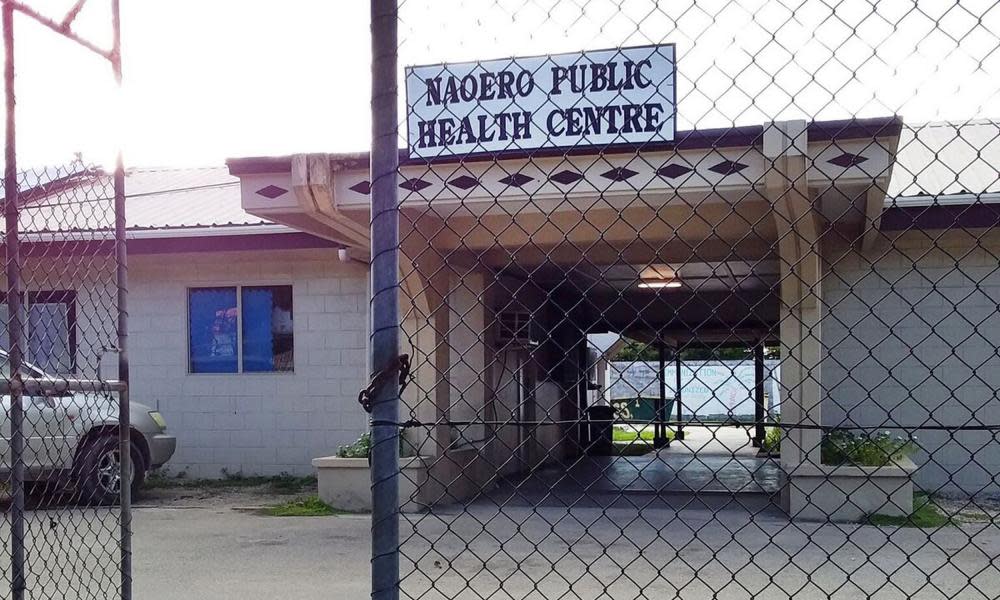Pakistani refugee sets himself alight on Nauru

A 36-year-old Pakistani refugee has been hospitalised after he set himself alight on Nauru on Friday.
This comes amid warnings the government’s attempts to repeal the medevac laws could have fatal consequences, and accusations by Medecins Sans Frontieres that Nauru has breached medical ethics.
There are also concerns that more than 50 men were sent to Papua New Guinea’s immigration detention centre without access to phones in a bid to block applications for medevac.
The home affairs department confirmed an incident of self-harm had occurred on Nauru, and said the man was “receiving appropriate medical support” at the Republic of Nauru hospital.
Related: Abandoning medevac would be 'disastrous', former home affairs official says
“The Australian and Nauru governments will continue to provide support,” a spokesman said.
There are almost 300 people still on Nauru under the offshore processing regime established by the Australian government there and on PNG’s Manus Island.
A Senate inquiry is examining a government bill to repeal the medevac laws, which give Australian doctors power to facilitate the urgent medical transfer of a refugee from Manus and Nauru. The government’s previous – and still existing – policy often saw delays of up to five years.
At Sydney’s Westmead children’s hospital on Friday, a refugee paediatric health conference heard the government’s original system for medical transfers was “incredibly difficult”, and that the medevac system must stay in place.
“I’m still speechless that people didn’t die while we were there,” a MSF psychiatrist, Beth O’Connor, said.
“We were so close so many times. It was more good luck than good management, and I don’t think we should be relying on luck when the system can be managed.”
A lawyer, George Newhouse, urged against putting the transfer decisions back into the hands of government.
“My advice to senators would be to look into their consciences and think about the impacts of allowing bureaucrats and/or politicians to make medical decisions,” he said.
“Because people have died as a result of their delay and political decision making. And they will continue to die if they revoke medevac.”
Related: Gillian Triggs says 'vindictive point-scoring' behind Coalition's medevac repeal
The panel members’ fears joined warnings from dozens of other experts and organisations who have made submissions to the inquiry – due to report in October – the consequences of repealing medevac, including fatalities.
In a submission to the Senate inquiry, MSF reiterated its damning findings on the state of health and healthcare on Nauru, and called for Australia to act.
It is scheduled to appear at the inquiry on Monday.
Its executive director for Australia, Paul McPhun,said that when the group arrived on Nauru in November 2017 it found a mental health crisis which the government was not equipped to deal with.
“Several incidents during our time on the island concerned us, as did the government of Nauru’s willingness to delay and block transfers against professional medical advice,” he said.
“And to eject MSF with little warning in October 2018, and in doing so cut off patients from their doctors, clearly placed these patients unnecessarily at risk and compromised our medical professionals’ ability to do their duty.”
MSF was abruptly kicked off Nauru in October after almost a year of providing psychiatric treatment. Nauru accused it of conspiring against the government, and said it had expelled MSF when it learned the doctors were treating refugees as well as Nauruans.
In response MSF produced its memorandum of understanding with the government, which clearly stated it was engaged to treat both groups without discrimination.
Shortly afterwards, the Nauruan government outlawed telemedicine, effectively cutting off MSF’s attempts to keep treating patients and hindering the medevac process.
McPhun said this was “a clear attempt to impede patients from accessing professional medical care of their choice, again a threat to patients’ interests and ultimately their wellbeing”.
Last week PNG immigration authorities sent more than 50 men to the immigration detention centre in the Bomana prison complex in Port Moresby.
Their phones were taken and, according to the Kurdish Iranian journalist and refugee, Behrouz Boochani, they have not been given sufficient food and the UNHCR has not been able to visit. The UNHCR declined to comment.
Boochani said more than 20 men had self harmed since their detention and some were hospitalised. He accused the Australian and PNG governments of detaining the men and removing their phones to halt any applications for medevac.
He added that the PNG government has begun transferring all Manus-residing men to Port Moresby, despite earlier presenting it as voluntary.
• Crisis support services can be reached 24 hours a day: Lifeline 13 11 14; Suicide Call Back Service 1300 659 467; Kids Helpline 1800 55 1800; MensLine Australia 1300 78 99 78; Beyond Blue 1300 22 4636

 Yahoo News
Yahoo News 
